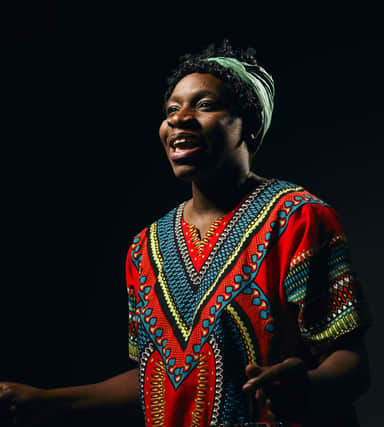A tale inspired by Nina Simone on the Chichester stage


Now entering its 11th year, the show comes to Chichester’s Minerva Theatre from Tuesday to Saturday, February 20-24.
The play follows a successful singer and civil rights activist as she seeks redemption after the untimely death of her father. She reflects on the journey that took her from a young piano prodigy destined for a life in the service of the church, to a renowned jazz vocalist at the forefront of the civil rights movement.
Advertisement
Hide AdAdvertisement
Hide Ad“I guess it really started when I was at college at Florida International University and for our senior project we had to write a one-person show,” Apphia recalls. “I was really struggling and a friend of mine said I should do something about Nina Simone because she was such an interesting woman. I said ‘Who is Nina Simone?’ I didn't end up writing about her at the time but after college I started listening to some of her music and just fell in love with her and started reading up about her. Later in life she had mental health issues and I think sometimes that moves people away from what she actually achieved.
“She was one of the artists to put her voice and her music to the resistance against white supremacy and to support the civil rights movement. It alienated her to some audiences and it was detrimental to her career but she didn't care because that was all she wanted to use her voice for. When she was on stage she was very confident, but I think in her personal life she was traditional. She wanted the man to head the household and she wanted to be a wife. There was a time when she just wanted to be at home. That was the role she wanted for herself.”
But driving her was a strong sense of injustice: “She found that she could say something and do something and use her platform and hopefully provide change. At first she didn't see herself as a jazz musician or as a folk musician. She was a classical pianist and that's what she wanted to do. But she was rejected from the Curtis Institute and she believed she was rejected on grounds of race. After that she was at a bit of a loss wondering what she was going to do with her life but she got a job in a bar and that's when she discovered her voice. The bar owner said ‘You're not going to just sit at the piano and play. You have got to sing something.’ And she did and that's when she started exploring her voice and started to get the opportunities.
“My piece is inspired by Nina Simone and her life. It is her story but there are things where I use my creative licence. I always wanted to use my own singing voice. I wanted to explore the woman behind the music and sometimes when you are singing as someone it can deflect because the audience are thinking whether it’s a good impression or not.
"I really wanted to do it as authentically as I could.
"I knew that I don't sound like her but I knew that I could convey the deeper emotions that she had.”